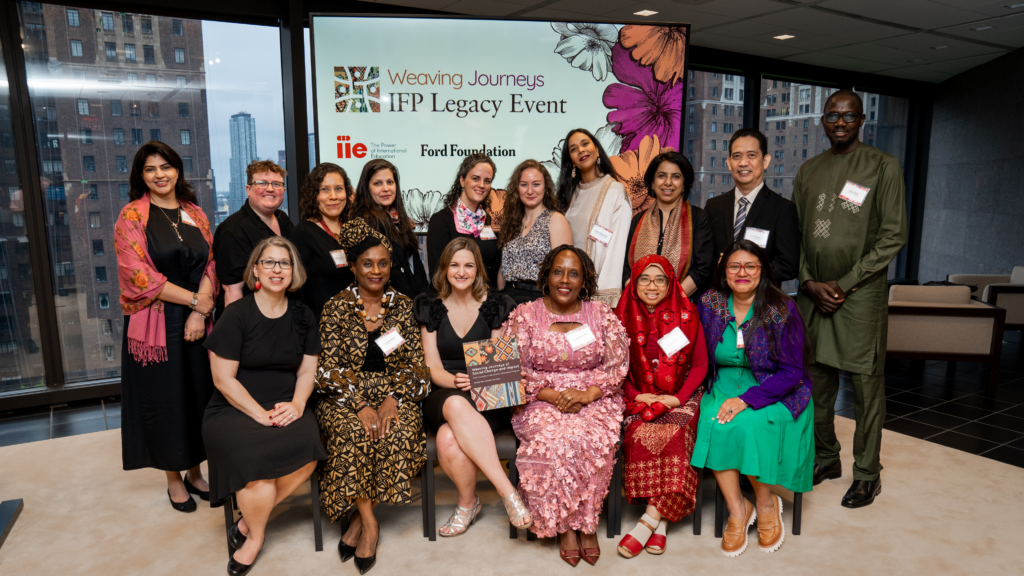Education has long been viewed as a vehicle for economic and social mobility for individuals and nations alike, and it was a driving principle behind the Ford Foundation’s groundbreaking International Fellowships Program (IFP). Today, however, data is currency, which places an increase in demand for demonstrable returns on investment, including education. How can you measure the impact of investing in a person’s education? That’s what IIE’s Research, Evaluation, and Learning (REL) team did for a decade, and I was fortunate to join the investigation, most recently resulting in the 2024 publication of Weaving Journeys of Social Change and Impact. The book is a retrospective of both the Ford IFP itself as well as learnings from IIE’s subsequent IFP Alumni Tracking Study of the program’s long-term impacts. Between 2001 and 2013, the Ford IFP supported advanced studies for more than 4,000 leaders from 22 countries across Latin America, Africa, the Middle East, and Asia.
IIE’s REL division uncovered several noteworthy findings as they conducted the study from 2013 to 2024. For example, 42% of IFP alumni who participated in the study became public officials in their respective countries. As time progressed in IIE’s 11-year study, IFP alumni advanced in their respective careers and amassed the economic security and social capital they needed to drive multiplier effects in their respective networks—from mentoring emerging leaders to providing expert guidance for the benefit of their home communities at large. Consider some highlights:
- In a comparison of alumni responses across the 2015 and 2018 surveys, more alumni respondents reported being role models in their communities in the later period.
- Of alumni respondents who reported a positive change in their places of employment, 74.2% are working directly with their home communities. Most of these organizations provide technical services and advocacy in these communities, with 63.8% providing technical assistance and 62% providing training.
- 695 IFP alumni have founded new organizations, and 1 in 10 were created with a fellow IFP alum.
Perhaps the most significant impact is a quality that can’t sufficiently be quantified: the cultivation of an enduring sense of shared responsibility to their communities. Most IFP alumni who participated in IIE’s study reported that the IFP helped them to understand the value of availing opportunities for others in their respective communities and organizations—and it empowered them to do so on an ongoing basis.
I had the opportunity to co-author a Weaving Journeys chapter with Gabriela Lopez Sotomayor, an IFP alumna from Peru who specializes in rural development and environmental sustainability; in 2002, she received a Ford IFP Fellowship through which she earned a master’s in agricultural tropical development at Institut Agro Montpellier in France. In the process of working with Gabriela, I learned a great deal about the research process of measuring global leadership and social impact. In addition to cultivating a productive working relationship with Gabriela, this experience offered insights into effective coauthoring practices.
Do your research
- Make time for a quiet session to think about your coauthor. Start by reading their resume.
- What have they researched, contributed to, or published?
- What is their primary language? Is it the same as the language of the chapter?
- Where are they located? Familiarize yourself with any time difference between locations.
- How comfortable are they with using meeting platforms?
Set parameters
- What is the overarching timeline of the project?
- What systems are necessary? Who will procure them for you and your coauthor?
- Who will create the meetings or schedule?
- What should be covered in the first meeting?
- Don’t be afraid to ask, what could possibly go wrong?
Communicate well
- Pace yourself and pause while talking.
- Be an active listener.
- The first meeting should have ample time to meet each other and cover the overarching timeline of the project and the shared expectations toward creating the chapter.
- Send the invite to the second meeting while in the first meeting. Agree on what each author will bring to the second meeting.
- Establish a communication protocol for modifying things at the “last minute.”
Benefits of coauthoring
- Working with a coauthor can bring together different skill sets and areas of expertise. This can lead to a better-informed and more well-rounded chapter, with each author learning along the way.
- Revising together in real-time can enrich the discourse, leading to a clearer understanding of each other.
- Coauthoring can be a proactive way of keeping each other accountable and motivated to maintain a consistent writing schedule and meet deadlines.
IIE invites you to the IFP Alumni Tracking Study website to explore the data and stories. Weaving Journeys of Social Change and Impact Ford Foundation International Fellowships Program is available for purchase through the IIE Bookstore.
